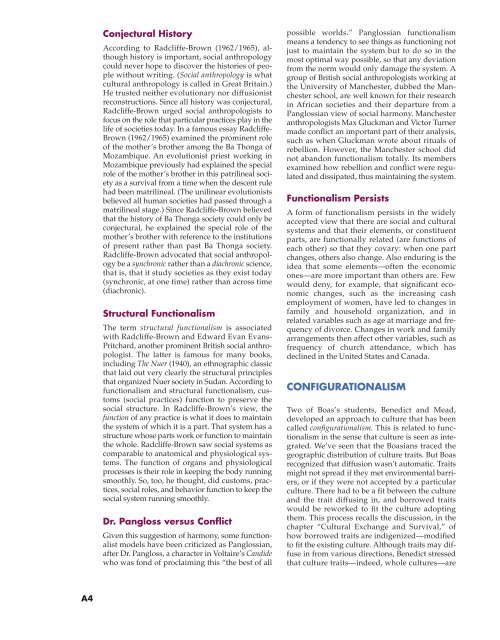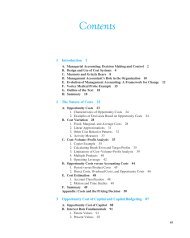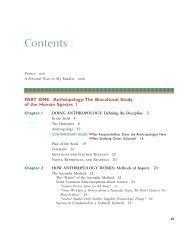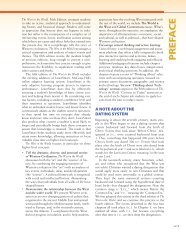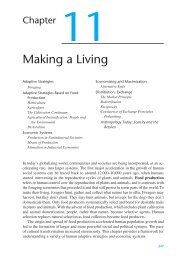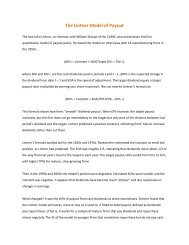Appendix 1 A History of Theories in Anthropology
Appendix 1 A History of Theories in Anthropology
Appendix 1 A History of Theories in Anthropology
Create successful ePaper yourself
Turn your PDF publications into a flip-book with our unique Google optimized e-Paper software.
A4<br />
Conjectural <strong>History</strong><br />
Accord<strong>in</strong>g to Radcliffe-Brown (1962/1965), although<br />
history is important, social anthropology<br />
could never hope to discover the histories <strong>of</strong> people<br />
without writ<strong>in</strong>g. (Social anthropology is what<br />
cultural anthropology is called <strong>in</strong> Great Brita<strong>in</strong>.)<br />
He trusted neither evolutionary nor diffusionist<br />
reconstructions. S<strong>in</strong>ce all history was conjectural,<br />
Radcliffe-Brown urged social anthropologists to<br />
focus on the role that particular practices play <strong>in</strong> the<br />
life <strong>of</strong> societies today. In a famous essay Radcliffe-<br />
Brown (1962/1965) exam<strong>in</strong>ed the prom<strong>in</strong>ent role<br />
<strong>of</strong> the mother’s brother among the Ba Thonga <strong>of</strong><br />
Mozambique. An evolutionist priest work<strong>in</strong>g <strong>in</strong><br />
Mozambique previously had expla<strong>in</strong>ed the special<br />
role <strong>of</strong> the mother’s brother <strong>in</strong> this patril<strong>in</strong>eal society<br />
as a survival from a time when the descent rule<br />
had been matril<strong>in</strong>eal. (The unil<strong>in</strong>ear evolutionists<br />
believed all human societies had passed through a<br />
matril<strong>in</strong>eal stage.) S<strong>in</strong>ce Radcliffe-Brown believed<br />
that the history <strong>of</strong> Ba Thonga society could only be<br />
conjectural, he expla<strong>in</strong>ed the special role <strong>of</strong> the<br />
mother’s brother with reference to the <strong>in</strong>stitutions<br />
<strong>of</strong> present rather than past Ba Thonga society.<br />
Radcliffe-Brown advocated that social anthropology<br />
be a synchronic rather than a diachronic science,<br />
that is, that it study societies as they exist today<br />
(synchronic, at one time) rather than across time<br />
(diachronic).<br />
Structural Functionalism<br />
The term structural functionalism is associated<br />
with Radcliffe-Brown and Edward Evan Evans-<br />
Pritchard, another prom<strong>in</strong>ent British social anthropologist.<br />
The latter is famous for many books,<br />
<strong>in</strong>clud<strong>in</strong>g The Nuer (1940), an ethnographic classic<br />
that laid out very clearly the structural pr<strong>in</strong>ciples<br />
that organized Nuer society <strong>in</strong> Sudan. Accord<strong>in</strong>g to<br />
functionalism and structural functionalism, customs<br />
(social practices) function to preserve the<br />
social structure. In Radcliffe-Brown’s view, the<br />
function <strong>of</strong> any practice is what it does to ma<strong>in</strong>ta<strong>in</strong><br />
the system <strong>of</strong> which it is a part. That system has a<br />
structure whose parts work or function to ma<strong>in</strong>ta<strong>in</strong><br />
the whole. Radcliffe-Brown saw social systems as<br />
comparable to anatomical and physiological systems.<br />
The function <strong>of</strong> organs and physiological<br />
processes is their role <strong>in</strong> keep<strong>in</strong>g the body runn<strong>in</strong>g<br />
smoothly. So, too, he thought, did customs, practices,<br />
social roles, and behavior function to keep the<br />
social system runn<strong>in</strong>g smoothly.<br />
Dr. Pangloss versus Conflict<br />
Given this suggestion <strong>of</strong> harmony, some functionalist<br />
models have been criticized as Panglossian,<br />
after Dr. Pangloss, a character <strong>in</strong> Voltaire’s Candide<br />
who was fond <strong>of</strong> proclaim<strong>in</strong>g this “the best <strong>of</strong> all<br />
possible worlds.” Panglossian functionalism<br />
means a tendency to see th<strong>in</strong>gs as function<strong>in</strong>g not<br />
just to ma<strong>in</strong>ta<strong>in</strong> the system but to do so <strong>in</strong> the<br />
most optimal way possible, so that any deviation<br />
from the norm would only damage the system. A<br />
group <strong>of</strong> British social anthropologists work<strong>in</strong>g at<br />
the University <strong>of</strong> Manchester, dubbed the Manchester<br />
school, are well known for their research<br />
<strong>in</strong> African societies and their departure from a<br />
Panglossian view <strong>of</strong> social harmony. Manchester<br />
anthropologists Max Gluckman and Victor Turner<br />
made conflict an important part <strong>of</strong> their analysis,<br />
such as when Gluckman wrote about rituals <strong>of</strong><br />
rebellion. However, the Manchester school did<br />
not abandon functionalism totally. Its members<br />
exam<strong>in</strong>ed how rebellion and conflict were regulated<br />
and dissipated, thus ma<strong>in</strong>ta<strong>in</strong><strong>in</strong>g the system.<br />
Functionalism Persists<br />
A form <strong>of</strong> functionalism persists <strong>in</strong> the widely<br />
accepted view that there are social and cultural<br />
systems and that their elements, or constituent<br />
parts, are functionally related (are functions <strong>of</strong><br />
each other) so that they covary: when one part<br />
changes, others also change. Also endur<strong>in</strong>g is the<br />
idea that some elements—<strong>of</strong>ten the economic<br />
ones—are more important than others are. Few<br />
would deny, for example, that significant economic<br />
changes, such as the <strong>in</strong>creas<strong>in</strong>g cash<br />
employment <strong>of</strong> women, have led to changes <strong>in</strong><br />
family and household organization, and <strong>in</strong><br />
related variables such as age at marriage and frequency<br />
<strong>of</strong> divorce. Changes <strong>in</strong> work and family<br />
arrangements then affect other variables, such as<br />
frequency <strong>of</strong> church attendance, which has<br />
decl<strong>in</strong>ed <strong>in</strong> the United States and Canada.<br />
CONFIGURATIONALISM<br />
Two <strong>of</strong> Boas’s students, Benedict and Mead,<br />
developed an approach to culture that has been<br />
called configurationalism. This is related to functionalism<br />
<strong>in</strong> the sense that culture is seen as <strong>in</strong>tegrated.<br />
We’ve seen that the Boasians traced the<br />
geographic distribution <strong>of</strong> culture traits. But Boas<br />
recognized that diffusion wasn’t automatic. Traits<br />
might not spread if they met environmental barriers,<br />
or if they were not accepted by a particular<br />
culture. There had to be a fit between the culture<br />
and the trait diffus<strong>in</strong>g <strong>in</strong>, and borrowed traits<br />
would be reworked to fit the culture adopt<strong>in</strong>g<br />
them. This process recalls the discussion, <strong>in</strong> the<br />
chapter “Cultural Exchange and Survival,” <strong>of</strong><br />
how borrowed traits are <strong>in</strong>digenized—modified<br />
to fit the exist<strong>in</strong>g culture. Although traits may diffuse<br />
<strong>in</strong> from various directions, Benedict stressed<br />
that culture traits—<strong>in</strong>deed, whole cultures—are


